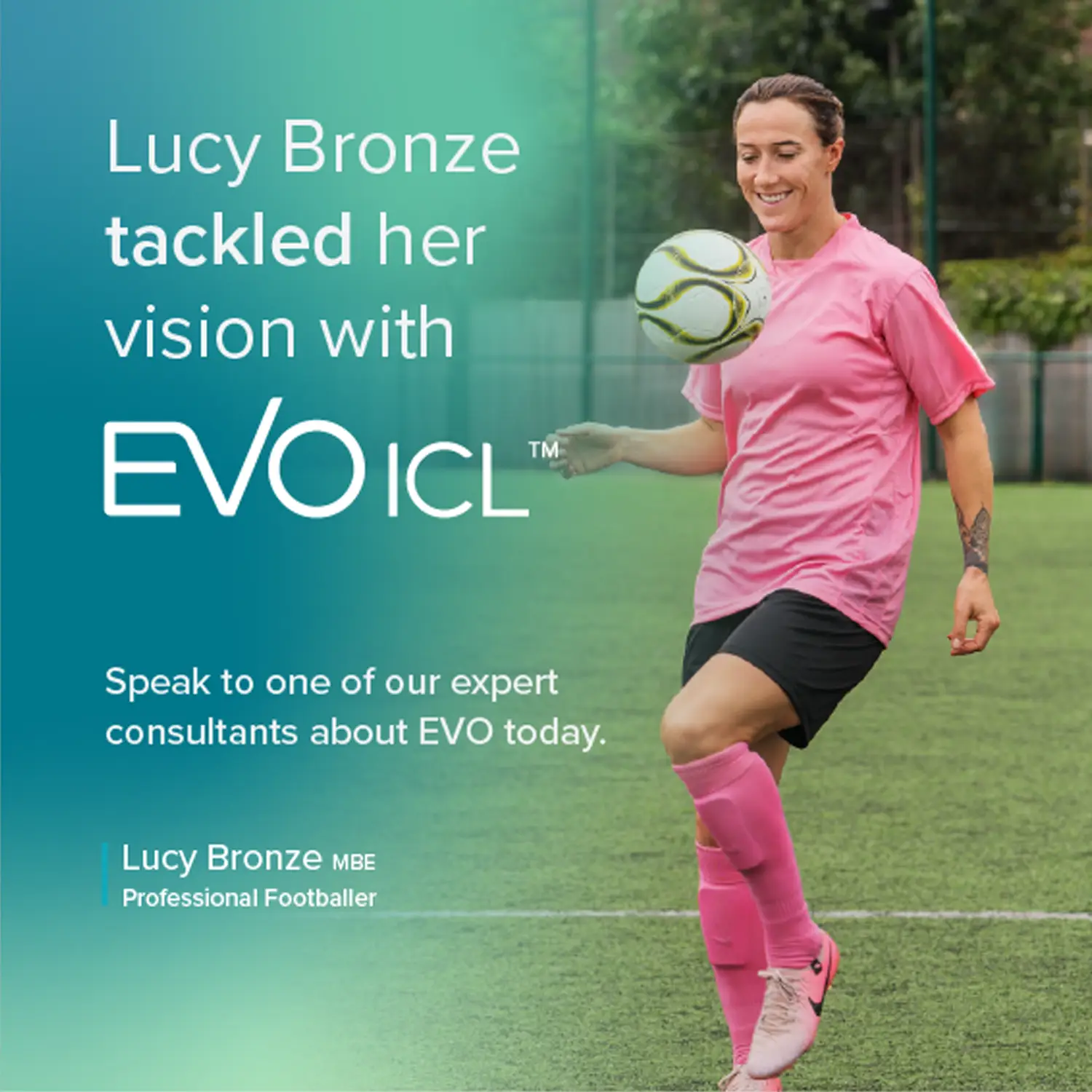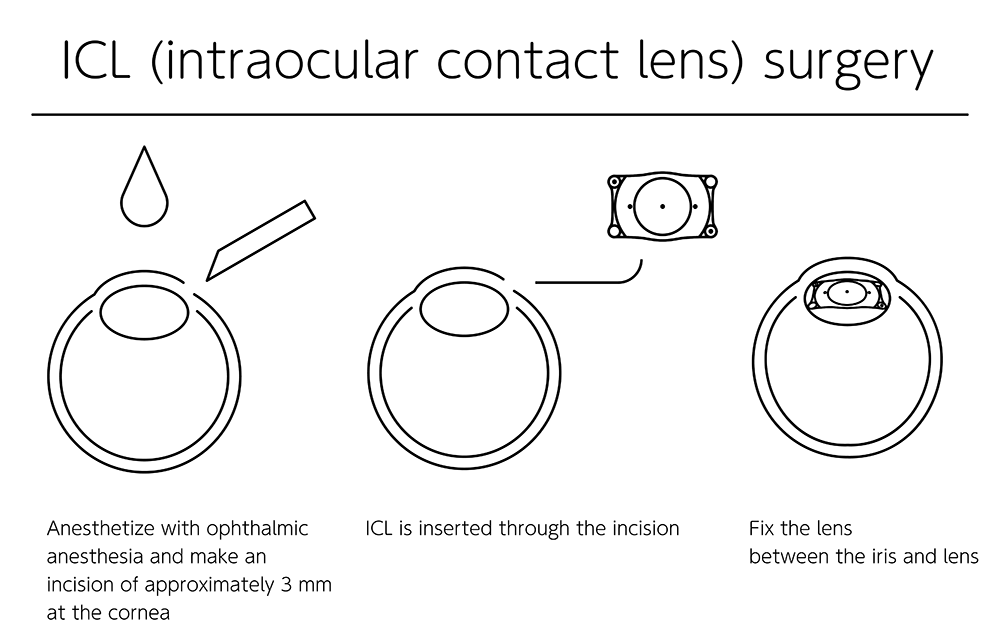Do glasses or contact lenses hold you back during physical activities? Many London athletes now choose ICL surgery to enhance their active lifestyle. Research shows that 99.4% of patients would opt for ICL again, making it a top choice for sports enthusiasts throughout the UK.
EVO ICL provides a safer option for athletes who play contact and adventure sports because it preserves your eye’s structure, unlike traditional laser procedures that remove corneal tissue. The success story of Lucy Bronze MBE demonstrates ICL’s effectiveness. This winner of UEFA Women‘s Euro 2022 with England and five-time UEFA Women’s Champions League champion found her solution through ICL. She needed vision correction since her teenage years with a low myopic prescription of around -3.00 D. The quick 20-30 minute procedure lets athletes return to their training routine with minimal recovery time.
This piece explains why London’s athletic community increasingly chooses ICL surgery and how it can enhance your sports performance without the usual constraints of glasses or contacts.

Why Athletes in London Are Turning to ICL Surgery
Professional athletes in London are finding that ICL for active lifestyle gives them a freedom traditional vision correction can’t match. Professional footballer Lucy Bronze was open about how poor vision affected her game: “My bad eyesight was definitely an inconvenience for me, not just in my football and my lifestyle, but in all ways of life”.
The demands of an active lifestyle
Athletes need more than just clear vision, it’s a vital performance tool. Your visual acuity directly affects your athletic abilities whether you track a moving ball, judge distances, or make quick decisions. Athletes who lead active lives need vision solutions that can handle physical stress. Lucy Bronze put it well: “I’m someone who’s very active. I want to go swimming, play on the beach. I want to do all these things”. Their vision correction should be as adaptable and tough as they are.
Common vision challenges in sports
Athletes deal with specific visual problems that can hurt their performance:
- Depth perception issues: Poor distance judgement affects everything from a goalkeeper’s save to a golfer’s swing
- Tracking moving objects: A tennis ball or football needs precise visual focus
- Peripheral awareness: Limited side vision slows down reactions to movement
- Hand-eye coordination: Vision issues reduce speed and accuracy
These challenges get worse during competitions when every split second matters.
Why traditional solutions fall short
Traditional vision correction creates real problems for athletes. Glasses break easily during contact or slip off at key moments. They also create blind spots that can be risky in ever-changing sports situations. Contact lenses come with their own issues. Lucy Bronze remembers: “I had quite a few problems with contact lenses… you wear them past a few hours and you start to feel irritated – dry eye, rubbing your eyes”. She also talked about losing a lens during a league game: “For 5 or 10 minutes I was probably playing with one eye open – I couldn’t see properly”.
The environment poses extra challenges rain, wind, dirt, mud which can irritate contacts or cause infections. ICL surgery takes away these worries by giving athletes clear, stable vision without external devices. Your athletic performance deserves the best possible visual support. Lucy Bronze confirmed this after her ICL procedure: “My life is definitely simpler now on and off the pitch. It improved my eyesight to even better than 20/20”.
How ICL Surgery Supports an Active Lifestyle
ICL surgery revolutionises more than just simple vision correction. It gives specific advantages to people with active lifestyles.

Freedom from glasses and contact lenses
You won’t have to deal with external vision aids after ICL surgery. Professional footballer Lucy Bronze shares: “My life is definitely simpler now on and off the pitch. It improved my eyesight to even better than 20/20”. These implantable lenses stay secure inside your eye, so you won’t experience fogging, movement, or discomfort during intense physical activities.
No dry eye issues during intense activity
Your eyes won’t get dry from wind or sweat because ICL doesn’t sit on the eye’s surface. ICL surgery keeps your eye’s natural moisture levels intact. This makes it especially helpful if you’re prone to dryness. You’re nowhere near as likely to develop dry eye syndrome with ICL compared to laser eye surgery.
Superior night vision for evening training
You just need excellent vision in low-light conditions for evening training sessions. ICL gives you:
- Better vision in dim environments
- Less glare from headlights or floodlights
- Better contrast sensitivity
- Fewer halos and starbursts than other vision correction methods
Safe for contact and adventure sports
High-impact activities are no problem with ICL’s unmatched stability. Your lens stays secure inside your eye during movement, so you won’t worry about it coming loose. This makes ICL perfect for boxing, skiing, and even swimming after recovery. Athletes from all sports – runners, cyclists, cricketers, and footballers – need vision that works under pressure. Our surgeons at Precision Vision London suggest Implantable Contact Lens (ICL) surgery to get clear, stable, glasses-free vision that fits perfectly with active lifestyles. Swimmers get extra benefits like better-fitting goggles and reliable underwater focus with ICL. The procedure keeps your corneal structure intact, which makes your eyes more resilient to physical impact than treatments creating a corneal flap.
Inside the ICL Procedure: What Athletes Can Expect
The ICL procedure offers a simplified process that fits perfectly into busy athletes’ lives who just need vision freedom. The trip involves several clear stages with minimal downtime.
Pre-surgery consultation and eye mapping
Your ICL trip starts with a 90-minute consultation at Precision Vision London. This complete assessment has corneal tomography scanning, pupil measurements, and a detailed retina examination. These precise measurements help create your customised ICL that matches your unique visual needs.
The ICL insertion process
The procedure takes only 10-20 minutes per eye on surgery day. The surgeon applies anaesthetic eye drops and creates a tiny keyhole incision (2-3mm) at your cornea’s edge. A special delivery device positions the folded ICL behind your iris, where it naturally unfolds into place.
Quick recovery timeline
Athletes notice vision improvement within 24 hours. You might experience slight haziness or fluctuating vision in the first 3-5 days. Most patients return to work within 1-2 days. This quick recovery makes ICL perfect for athletes who have demanding training schedules.
Post-op care and follow-up for athletes
You will receive antibiotic and anti-inflammatory eye drops to use for about two weeks after surgery. Your follow-up visits happen at one day, one week, one month, and three months after surgery. Light activities can resume within 24 hours, but you should avoid contact sports for at least two weeks.
Why Choose Precision Vision London for ICL Surgery
Picking the right clinic for your ICL surgery is vital to achieve the best athletic performance results. Precision Vision London has become the go-to destination for athletes who want to correct their vision.
Expert surgeons with sports vision experience
Dr. CT Pillai leads our clinic with years of specialised experience in eye surgery for athletes. Our surgical team blends technical excellence with a deep grasp of what athletes need from their vision. We know exactly how to tackle the unique challenges active people face.
Advanced diagnostic and surgical technology
Our clinic uses state-of-the-art equipment to deliver accurate, customised treatments. This advanced technology gives exceptional results that we tailor specifically to meet athletic performance needs.
Personalised care for athletic lifestyles
We give you detailed consultations that paint a full picture of your vision and help us understand your specific sports requirements. Our team thinks about everything from sport intensity to recovery timelines to create treatment plans just for you.
Trusted by elite UK athletes like Lucy Bronze
Professional footballer Lucy Bronze picked ICL surgery and saw amazing results: “My recovery was unbelievable. I was back playing sport and training within two to three weeks”. Her story shows why athletes trust our expertise completely. Book your ICL consultation today and experience vision built for performance.
Conclusion
ICL surgery is changing the game for athletes and active people in London. This innovative procedure gives you major advantages over traditional vision correction methods. You won’t have to deal with glasses or contact lenses during physical activities, and your corneal structure stays intact. The procedure also boosts your night vision, which makes evening training sessions safer and more effective.
Athletes with packed schedules love how quickly they recover. Most patients see better within 24 hours and can get back to light activities the next day. Your training routine barely skips a beat. Lucy Bronze’s story shows exactly how ICL can boost athletic performance. She competes at the highest level without worrying about her vision – that’s why so many London athletes are choosing this procedure. Clear, unobstructed vision is just as important as physical training when you’re competing at any level.
Precision Vision London’s expertise in ICL procedures matches athletes’ specific needs perfectly. Dr. CT Pillai and the surgical team know what different sports demand visually and create treatments that work best for each one. Their cutting-edge technology and personal approach deliver the best results for every patient.
Your active lifestyle needs vision that can keep up with your goals. ICL surgery gives you the freedom and confidence to perform your best in swimming, running, cycling, or contact sports without vision holding you back. While you need to think carefully about any surgery, ICL patients’ overwhelming satisfaction tells the real story. Ready to break free from vision limits? Book your consultation at Precision Vision London and see how ICL surgery can reshape both your vision and your sports experience.
FAQs
Q1. How soon can I resume sports activities after ICL surgery? You can typically return to most sports activities two weeks after ICL surgery. For contact sports, it’s advisable to use protective eyewear, such as polycarbonate sports glasses.
Q2. When can I start running again following ICL surgery? Generally, you can resume normal sporting activities, including running, about a week after ICL surgery. However, it’s best to avoid vigorous exercise during the first week to allow proper healing.
Q3. What is the typical recovery period after ICL surgery? The recovery period for most patients is relatively short. Vision may be blurry for one to two days post-surgery, but most individuals can return to work and usual activities shortly after that.
Q4. How does ICL surgery benefit athletes compared to traditional vision correction methods? ICL surgery offers athletes freedom from glasses and contact lenses, eliminates dry eye issues during intense activity, provides superior night vision for evening training, and is safe for contact and adventure sports.
Q5. Is ICL surgery suitable for swimmers? Yes, ICL surgery is particularly beneficial for swimmers. It allows for better-fitting goggles and reliable underwater focus without the concerns of contact lenses or glasses. Swimming can typically be resumed a few weeks after the procedure, following your surgeon’s advice.
Authors & Reviewer
-
 Olivia: Author
Olivia: AuthorHi, I'm Olivia, a passionate writer specialising in eye care, vision health, and the latest advancements in optometry. I strive to craft informative and engaging articles that help readers make informed decisions about their eye health. With a keen eye for detail and a commitment to delivering accurate, research-backed content, I aim to educate and inspire through every piece I write.
-
 Dr. CT Pillai: Reviewer
Dr. CT Pillai: ReviewerDr. CT Pillai is a globally recognised ophthalmologist with over 30 years of experience, specialising in refractive surgery and general ophthalmology. Renowned for performing over 50,000 successful laser procedures.


